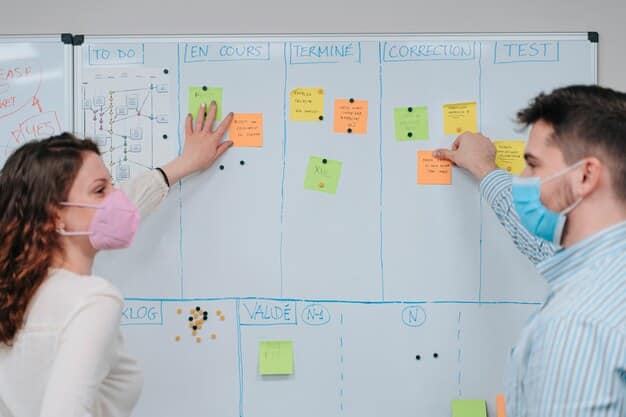The Future of Work: Job Trends and Skills for 2025

The Future of Work: Emerging Job Trends and Skills You Need to Succeed in 2025 encompasses rapid technological advancements, shifting demographics, and evolving economic landscapes, requiring individuals to acquire new skills in areas like artificial intelligence, data analysis, and adaptability to thrive in the changing job market.
The world of work is constantly evolving, and understanding The Future of Work: Emerging Job Trends and Skills You Need to Succeed in 2025 is crucial for career planning and professional development. Are you ready to adapt and thrive in the changing landscape?
Understanding the Shifting Landscape of Work
The work landscape is undergoing a profound transformation. This isn’t just about new jobs appearing; it’s about a fundamental shift in how we work, where we work, and the skills that are most valued.
To navigate this shift successfully, we need to understand the driving forces behind it and the emerging trends that will shape the future of work. This requires a proactive approach to learning and adaptation.

Key Drivers of Change
Several key factors are fueling the evolution of work:
- Technological Advancements: Automation, artificial intelligence, and machine learning are automating routine tasks, requiring workers to focus on more creative and strategic roles.
- Globalization: The interconnectedness of the global economy is increasing competition and creating new opportunities for collaboration across borders.
- Demographic Shifts: An aging workforce and changing demographics are creating skills gaps and requiring employers to adapt their talent strategies.
- Changing Employee Expectations: Employees are increasingly seeking flexible work arrangements, purpose-driven work, and opportunities for growth and development.
These drivers are converging to create a dynamic and unpredictable work environment. To stay ahead, individuals and organizations alike must embrace agility and continuous learning.
Emerging Job Trends in 2025
Identifying emerging job trends is essential for making informed career decisions and preparing for the future. Certain sectors and roles are poised for significant growth.
Understanding these trends can help you gain a competitive edge and position yourself for success in the evolving job market. Let’s explore those trends.
High-Growth Sectors
Several sectors are expected to experience significant job growth in the coming years:
- Technology: Demand for software developers, data scientists, cybersecurity analysts, and AI specialists will continue to surge.
- Healthcare: An aging population and advancements in medical technology will drive demand for healthcare professionals, including nurses, therapists, and medical technicians.
- Renewable Energy: The transition to a cleaner energy economy will create new jobs in solar, wind, and other renewable energy sectors.
- E-commerce and Logistics: The growth of online retail will fuel demand for logistics professionals, warehouse workers, and delivery drivers.
These sectors offer a wealth of opportunities for individuals with the right skills and experience.
Specific Job Roles to Watch
Within these high-growth sectors, certain job roles are particularly promising:
- AI and Machine Learning Specialists
- Data Scientists and Analysts
- Cybersecurity Experts
- Renewable Energy Engineers
- Robotics Engineers
These roles require specialized skills and knowledge, but they also offer high earning potential and opportunities for innovation.
In conclusion, emerging job trends highlight a shift to careers deeply rooted in data analysis, technological innovation, and sustainable practices, reflecting a future where adaptability and specialized knowledge are highly valued.
Essential Skills for the Future Workforce
Technical skills are important, but they are not enough. Employers are increasingly seeking candidates with a combination of technical skills and soft skills.
Cultivating a well-rounded skill set is essential for navigating the complexities of the modern workplace. The emphasis in the future job market is on adaptability, lifelong learning and the ability to work across various skill types.
The Importance of Technical Skills
Technical skills, also known as hard skills, are the specific knowledge and abilities required to perform a particular job. Some of the most in-demand technical skills include:
- Data analysis and visualization
- Programming languages (e.g., Python, Java)
- Cloud computing (e.g., AWS, Azure)
These skills are essential for roles in technology, data science, and other technical fields. The ability to interpret and utilize data to drive business decisions is critical.

The Power of Soft Skills
Soft skills, also known as people skills, are the personal attributes and interpersonal abilities that enable individuals to interact effectively with others. Key soft skills include:
- Communication
- Problem-solving
- Critical Thinking
- Adaptability
These skills are essential for building relationships, collaborating effectively, and navigating complex challenges. Therefore, they are highly valued across all industries and job functions.
Mastering both technical and soft skills is key to thriving in the future workforce, ensuring professionals are well-equipped for the challenges and opportunities ahead.
The Rise of Remote Work and Distributed Teams
Remote work is no longer a perk; it’s a standard. The COVID-19 pandemic accelerated the adoption of remote work, and many companies are now embracing distributed team models.
This shift has significant implications for how we work, where we work, and the skills that are most valued. Therefore, it’s necessary to adapt. Remote work relies on different skills, different management and different tools to ensure success.
The Benefits of Remote Work
Remote work offers several benefits for both employers and employees:
- Increased Flexibility
- Improved Work-Life Balance
- Greater Access to Talent
These benefits are attracting more talent to organizations that embrace remote work. Those companies are seeing increased job applications, improved talent retention and high employee satisfaction rates.
Challenges of Managing Remote Teams
Managing distributed teams also presents challenges:
- Maintaining Communication and Collaboration
- Building Trust and Team Cohesion
- Ensuring Productivity and Accountability
Organizations need to invest in technologies and processes to overcome these challenges and foster a thriving remote work environment. It is very important that team members have the appropriate communications tools and the training to use them effectively.
Ultimately, mastering remote work and distributed team management is crucial for navigating the future of work and ensuring continued productivity and innovation.
Cultivating a Growth Mindset for Career Success
In a rapidly changing world, a growth mindset is essential for career success. This is the belief that abilities and intelligence can be developed through dedication and hard work.
Individuals with a growth mindset embrace challenges, persist through obstacles, and view failures as opportunities for learning and growth. But more importantly, they enjoy the process of learning and improving themselves.
Embracing Lifelong Learning
Lifelong learning is the ongoing, voluntary, and self-motivated pursuit of knowledge for either personal or professional reasons. The idea here is to never stop learning and to continually enhance your skills
- Online Courses and Certifications
- Industry Conferences and Workshops
By actively engaging in lifelong learning, individuals can stay ahead of the curve and adapt to the changing demands of the workplace.
Developing Resilience and Adaptability
Resilience is the ability to bounce back from adversity, while adaptability is the ability to adjust to changing conditions. These skills are essential for navigating the uncertainties of the future of work:
- Embrace Change: View change as an opportunity for growth and innovation.
- Seek Feedback: Actively solicit feedback from colleagues and mentors to identify areas for improvement.
Individuals who cultivate resilience and adaptability are better equipped to handle challenges, overcome setbacks, and thrive in a dynamic environment.
In conclusion, cultivating a growth mindset, embracing lifelong learning, and developing resilience are key strategies for achieving career success in the dynamic future of work.
Preparing for the Future: Actionable Steps
Preparing for the future of work requires a proactive and strategic approach. Individuals need to take actionable steps to develop the skills and knowledge they need to succeed.
It is helpful to have a plan in place with short and long term goals as well as methods for measuring progress. This plan can then be reviewed and altered on a regular basis.
Assess Your Skills and Identify Gaps
Start by assessing your current skills and identifying any gaps that may need to be filled. This involves:
- Taking skills assessments and personality tests
- Seeking feedback from colleagues and mentors
By understanding your strengths and weaknesses, you can create a targeted development plan to acquire the skills that are most in-demand. This will help ensure you are not wasting time on skills that are not in demand or will not be needed in the future.
Create a Development Plan
Once you have identified your skills gaps, create a development plan to address them. This may involve:
- Taking online courses or workshops
- Seeking mentorship or coaching
Your development plan should be specific, measurable, achievable, relevant, and time-bound (SMART). Also, you may have to revise your development plan frequently if the external environment changes.
In summary, preparing for the future of work requires assessing your skills, creating a development plan, networking strategically, and staying informed about industry trends.
| Key Point | Brief Description |
|---|---|
| 🚀 Emerging Job Trends | Tech and Healthcare sectors are booming with roles in AI, data, and renewable energy. |
| 📚 Essential Skills | Technical skills like data analysis paired with soft skills such as communication are key. |
| 🌍 Remote Work | Embrace remote work by enhancing digital communication and trust among distributed teams. |





